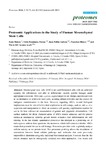Mostrar o rexistro simple do ítem
Proteomic applications in the study of human mesenchymal stem cells
| dc.contributor.author | Mateos, Jesús | |
| dc.contributor.author | Arufe, M.C. | |
| dc.contributor.author | Fernández-Pernas, Pablo | |
| dc.contributor.author | Fafián Labora, Juan Antonio | |
| dc.contributor.author | Blanco García, Francisco J | |
| dc.date | 2014 | |
| dc.date.accessioned | 2017-04-26T07:46:25Z | |
| dc.date.available | 2017-04-26T07:46:25Z | |
| dc.date.issued | 2014-02-07 | |
| dc.identifier.citation | Mateos J, Pernas PF, Labora JF, Blanco F, Arufe MD. Proteomic Applications in the Study of Human Mesenchymal Stem Cells. Proteomes. 2014 Feb 7;2(1):53-71. | es_ES |
| dc.identifier.issn | 2227-7382 | |
| dc.identifier.uri | http://hdl.handle.net/2183/18446 | |
| dc.description.abstract | Mesenchymal stem cells (MSCs) are undifferentiated cells with an unlimited capacity for self-renewal and able to differentiate towards specific lineages under appropriate conditions. MSCs are, a priori, a good target for cell therapy and clinical trials as an alternative to embryonic stem cells, avoiding ethical problems and the chance for malignant transformation in the host. However, regarding MSCs, several biological implications must be solved before their application in cell therapy, such as safe ex vivo expansion and manipulation to obtain an extensive cell quantity amplification number for use in the host without risk accumulation of genetic and epigenetic abnormalities. Cell surface markers for direct characterization of MSCs remain unknown, and the precise molecular mechanisms whereby growth factors stimulate their differentiation are still missing. In the last decade, quantitative proteomics has emerged as a promising set of techniques to address these questions, the answers to which will determine whether MSCs retain their potential for use in cell therapy. Proteomics provides tools to globally analyze cellular activity at the protein level. This proteomic profiling allows the elucidation of connections between broad cellular pathways and molecules that were previously impossible to determine using only traditional biochemical analysis. However; thus far, the results obtained must be orthogonally validated with other approaches. This review will focus on how these techniques have been applied in the evaluation of MSCs for their future applications in safe therapies. | es_ES |
| dc.description.sponsorship | info:eu-repo/grantAgreement/MICINN/Programa Estatal de Fomento de la Investigación Científica y Técnica de Excelencia/PI11%2F02799/ES/Combinación de terapias celulares para la reparación de lesiones de cartílago | es_ES |
| dc.language.iso | eng | es_ES |
| dc.publisher | Multidisciplinary Digital Publishing Institute | es_ES |
| dc.relation.uri | http://dx.doi.org/10.3390/proteomes2010053 | es_ES |
| dc.rights | Creative Commons Attribution 3.0 International License (CC-BY 3.0) | es_ES |
| dc.rights.uri | http://creativecommons.org/licenses/by/3.0/ | |
| dc.subject | Mesenchymal stem cell | es_ES |
| dc.subject | Proteomic analysis | es_ES |
| dc.subject | Characterization | es_ES |
| dc.subject | Differentiation | es_ES |
| dc.title | Proteomic applications in the study of human mesenchymal stem cells | es_ES |
| dc.type | info:eu-repo/semantics/article | es_ES |
| dc.rights.access | info:eu-repo/semantics/openAccess | es_ES |
| UDC.journalTitle | Proteomes | es_ES |
| UDC.volume | 2 | es_ES |
| UDC.issue | 1 | es_ES |
| UDC.startPage | 53 | es_ES |
| UDC.endPage | 71 | es_ES |
Ficheiros no ítem
Este ítem aparece na(s) seguinte(s) colección(s)
-
GI-TCMR - Artigos [131]
-
INIBIC-TCMR - Artigos [102]
-
INIBIC- REUMA - Artigos [185]






